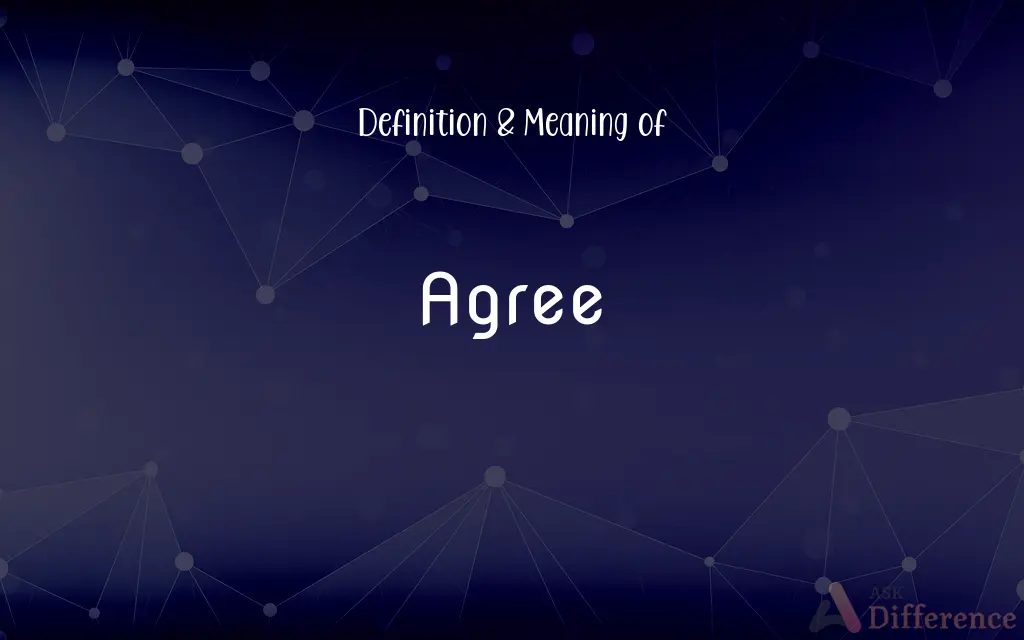Agree Definition and Meaning
By Maham Liaqat & Urooj Arif — Published on June 29, 2024
Agree refers to have the same opinion or to consent to a proposal or idea. e.g., After much discussion, they finally agreed on the terms of the contract.

Table of Contents
Agree Definitions
To give consent or approval to something proposed by another.
The committee agreed to the new policy changes.
To share the same view or opinion as someone else.
They all agreed that the movie was fantastic.
To be in harmony or accordance in terms of opinion or feeling.
Their tastes in music agree surprisingly well.
To make a decision together with someone.
They agreed to meet at the coffee shop at noon.
To come to a mutual decision or arrangement.
After lengthy negotiations, both parties agreed on a settlement.
To share an opinion or feeling; be in accord
I agree with you on that. We agree in our taste in music.
To express consent; concur
We agreed to her suggestion.
To accept or support a policy or program
I agree with the flat tax.
To come to an understanding or agreement, as by negotiating
We agreed on the price.
To be compatible or consistent
The copy agrees with the original. Your story agrees with mine.
To be suitable, appropriate, pleasing, or healthful
Spicy food does not agree with me.
(Grammar) To correspond in gender, number, case, or person.
To share an opinion about (something)
My doctor and I agree that I should quit smoking.
To grant or concede
My parents agreed that we should be allowed to go. I agreed to help my parents clean the house.
(intransitive) To be in harmony about an opinion, statement, or action; to have a consistent idea between two or more people.
All parties agree in the expediency of the law.
I mostly agree with what you said, but I consider your last point to be unfair.
I couldn't agree more with what you say.
To give assent; to accede
To agree to an offer, or to opinion.
The workers didn not agree to the new terms offered by the trade union.
To yield assent to; to approve.
(intransitive) To make a stipulation by way of settling differences or determining a price; to exchange promises; to come to terms or to a common resolve; to promise.
(intransitive) To resemble; to coincide; to correspond.
The picture does not agree with the original; the two scales agree exactly.
To suit or be adapted in its effects; to do well.
The same food does not agree with every constitution.
To correspond to (another word) in a grammatical category, such as gender, number, case, or person.
In Romanian, all articles, adjectives, and pronouns agree in gender, number and case with the noun they refer to.
To consent to a contract or to an element of a contract.
To harmonize in opinion, statement, or action; to be in unison or concord; to be or become united or consistent; to concur; as, all parties agree in the expediency of the law.
If music and sweet poetry agree.
Their witness agreed not together.
The more you agree together, the less hurt can your enemies do you.
To yield assent; to accede; - followed by to; as, to agree to an offer, or to opinion.
To make a stipulation by way of settling differences or determining a price; to exchange promises; to come to terms or to a common resolve; to promise.
Agree with thine adversary quickly.
Didst not thou agree with me for a penny ?
To be conformable; to resemble; to coincide; to correspond; as, the picture does not agree with the original; the two scales agree exactly.
To suit or be adapted in its effects; to do well; as, the same food does not agree with every constitution.
To correspond in gender, number, case, or person.
To make harmonious; to reconcile or make friends.
To admit, or come to one mind concerning; to settle; to arrange; as, to agree the fact; to agree differences.
Be in accord; be in agreement;
We agreed on the terms of the settlement
I can't agree with you!
I hold with those who say life is sacred
Both philosophers concord on this point
Consent or assent to a condition, or agree to do something;
She agreed to all my conditions
He agreed to leave her alone
Be compatible, similar or consistent; coincide in their characteristics;
The two stories don't agree in many details
The handwriting checks with the signature on the check
The suspect's fingerprints don't match those on the gun
Go together;
The colors don't harmonize
Their ideas concorded
Show grammatical agreement;
Subjects and verbs must always agree in English
Be agreeable or suitable;
White wine doesn't agree with me
Achieve harmony of opinion, feeling, or purpose;
No two of my colleagues would agree on whom to elect chairman
To match or correspond accurately.
The witness's account agrees with the evidence.
To accept a proposal or offer.
He agreed to the terms of the employment contract.
To say yes or to express consent verbally.
When asked if she was ready, she agreed enthusiastically.
To be suitable or compatible with something.
This wine agrees with the flavor of the dish perfectly.
To acknowledge and not contradict.
She agreed that the task was challenging but necessary.
Agree Snonyms
Consent
To give permission for something to happen.
She consented to have her story published.
Concur
To agree or have the same opinion.
The board members concurred with the decision to expand.
Acquiesce
To accept something reluctantly but without protest.
He acquiesced to their demands.
Assent
To express agreement or approval formally.
The president assented to the new legislation.
Approve
To agree with or accept as satisfactory.
The committee approved the budget proposal.
Comply
To agree or yield to a wish or command.
They complied with the safety regulations.
Accord
To be in agreement or harmony.
Their plans accorded with the company's goals.
Harmonize
To agree or be congruent with.
The new rules harmonize with the existing regulations.
Align
To bring into line or agreement.
Their interests aligned with the project's objectives.
Subscribe
To express agreement with an idea or proposal.
I subscribe to the theory that exercise is beneficial for mental health.
Agree Example Sentences
They didn't agree at first, but found a compromise.
Common Curiosities
What is a stressed syllable in "agree"?
The stressed syllable in "agree" is the second syllable, "gree."
How is "agree" used in a sentence?
"Agree" is used to indicate harmony or concurrence in opinion, decision, or action between individuals or groups.
What is the verb form of "agree"?
The verb form is "to agree."
What is the second form of "agree"?
The second form is "agreed."
How many syllables are in "agree"?
There are 2 syllables in "agree."
Why is it called "agree"?
"Agree" is derived from the Old French word "agreer," meaning "to please" or "to satisfy," which reflects the sense of harmony or accord in opinions or actions.
How do we divide "agree" into syllables?
"Agree" is divided into syllables as "a-gree."
What part of speech is "agree"?
"Agree" is a verb.
What is the third form of "agree"?
The third form is "agreed."
What is the opposite of "agree"?
The opposite of "agree" could be "disagree" or "dissent."
Is the "agree" term a metaphor?
"Agree" can be used metaphorically to describe a state of harmony or concurrence in various contexts.
Is the word "agree" imperative?
"Agree" can be used in an imperative form, as in giving a command or instruction to reach a state of concurrence.
Is the word “agree” a Direct object or an Indirect object?
As a verb, "agree" can take both direct and indirect objects, depending on the sentence structure.
Which vowel is used before "agree"?
Vowels before "agree" are not applicable as it is a verb.
What is the pronunciation of "agree"?
"Agree" is pronounced as /əˈɡriː/.
What is the root word of "agree"?
The root word of "agree" is the Old French "agreer," meaning "to please" or "to satisfy."
What is the first form of "agree"?
The first form is "agree."
Is "agree" an adverb?
No, "agree" is not an adverb.
Is "agree" a countable noun?
"Agree" is a verb, not a noun, so it is not countable.
Is "agree" a collective noun?
No, "agree" is not a noun; it is a verb.
What is the plural form of "agree"?
The verb "agree" does not have a plural form, but its actions can be described in plural terms.
Is "agree" a vowel or consonant?
The word "agree" starts with the vowel 'a.'
Is the word "agree" Gerund?
The gerund form of "agree" would be "agreeing."
Which determiner is used with "agree"?
Determiners are not typically used with verbs like "agree."
Which preposition is used with "agree"?
Prepositions such as "on," "to," and "with" (agree on, agree to, agree with) can be used with "agree," depending on the context.
Which conjunction is used with "agree"?
Conjunctions used with "agree" depend on the sentence structure; "and," "but," and "or" can all be used.
What is another term for "agree"?
Another term for "agree" is "concur."
Is "agree" a noun or adjective?
"Agree" is a verb.
Which article is used with "agree"?
Articles are not used directly with verbs like "agree."
What is the singular form of "agree"?
The singular form is "agree."
Is "agree" an abstract noun?
No, "agree" is a verb, not a noun.
Is "agree" a negative or positive word?
"Agree" is generally positive, indicating harmony or concurrence.
Share Your Discovery

Previous Term
Seating Definition and Meaning
Next Term
Explicate Definition and MeaningAuthor Spotlight
Written by
Maham LiaqatCo-written by
Urooj ArifUrooj is a skilled content writer at Ask Difference, known for her exceptional ability to simplify complex topics into engaging and informative content. With a passion for research and a flair for clear, concise writing, she consistently delivers articles that resonate with our diverse audience.
































